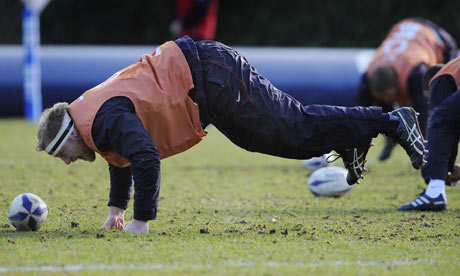
Mark Cueto said this week that England tried to play too much at the start against Wales: they passed the ball in the first six minutes virtually as much as they did in the entire second half, but his assertion that "realistically, you are not going to score a try from your own half at international level" did not stack up.
England's three tries against Wales all resulted from moves begun in their own half: Danny Care's quickly taken free-kick created the platform from which the men in white scored the opening try of the game; their second started when Steve Borthwick robbed Tom James just inside England territory and the third came after Delon Armitage intercepted Stephen Jones's pass behind the halfway line.
When Martin Johnson's management team took over in 2008, England looked to move the ball against Australia and South Africa, and were not afraid to do so inside their own half. The problem was the runners did not attack space and, moving laterally, were invariably closed down before they had crossed the gain line.
The difference with England on Saturday was that, after the opening salvo had got nowhere, they did attack space. They looked to play on the counterattack, a sensible tactic against Wales whose blitz defence is hard to break down when a team is using its own ball.
Australia defeated Wales in Cardiff last November through counterattacking, running back kicks in the opening half and exploiting a disorganised defence. England may have attacked from turnovers rather than punts, but the principle was the same and they smoked out Wales.
If past matches in Rome offer a guide, England will have opportunities to counterattack on Sunday. The final try against Wales was worthy of deciding a match: Toby Flood had only one thing on his mind when he received the ball from Armitage. Given the pressure England had come under after the autumn, it would have been tempting for him to hoof the ball towards the Wales line but he saw what was on and went for it.
A characteristic of New Zealand over the years has been their predilection for the counterattack. They kick the ball as much as anyone, but they are not shy, apart from last year when the breakdown directive had an inhibiting effect on them, to attack a disorganised defence.
When England announced their team to face Wales, the reaction was largely favourable because the back division brimmed with attacking intent. If Wales came to Twickenham loaded with idealism, it was England's pragmatism that prevailed: Mathew Tait touched the ball only seven times, but he played a part in the three tries.
That is the essence of international rugby. It demands patience and the awareness to appreciate an opportunity when it presents itself. Flood is unfortunate to find himself back on the bench, presumably, but Flutey has an acute awareness and more experience.
Flood is an outside-half option if England find themselves playing catch-up in the second half in Rome. Jonny Wilkinson passed the ball once in the second half against Wales and ran once, in the build-up to the second try, but after that he did nothing but kick as the home side looked to protect a healthy lead, taking no risks.
The weakest part of England's game on Saturday was the scrum where David Wilson struggled before being replaced by Dan Cole, who will make his first Test start in Rome. Cole, the son of Darren Garforth, looks one of the finds of many a season. With Julian White nearing the end of his career and Phil Vickery battling back from yet another major operation, England have uncorked a tighthead who will, in time, help them rediscover their scrummaging supremacy.
Johnson will name his replacements for Rome later this week, which suggests that Wilson's shoulder injury has not cleared up. Rome is not the place to go with a problem at prop, but Italy do not have a lot to offer outside the forward exchanges and with England rewarded for playing what was in front of them against Wales, they have the potential to run away with it in the second half.

